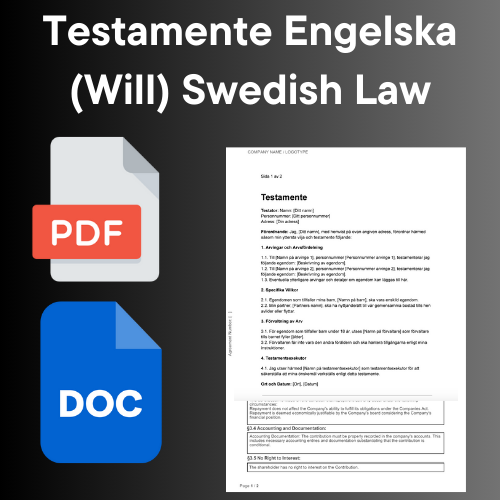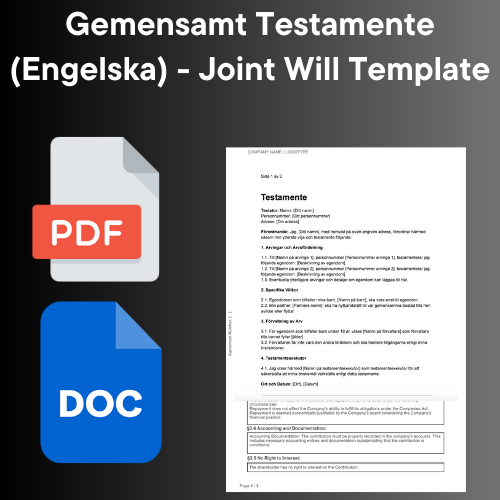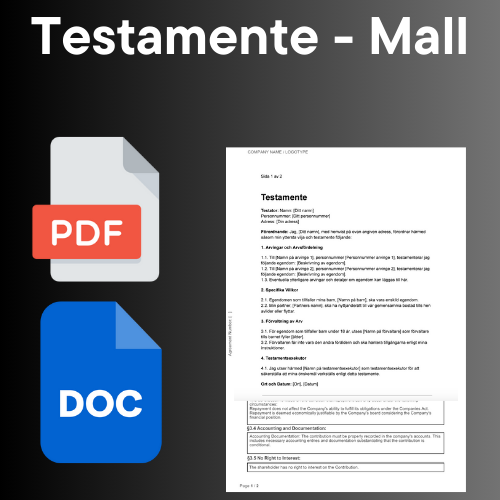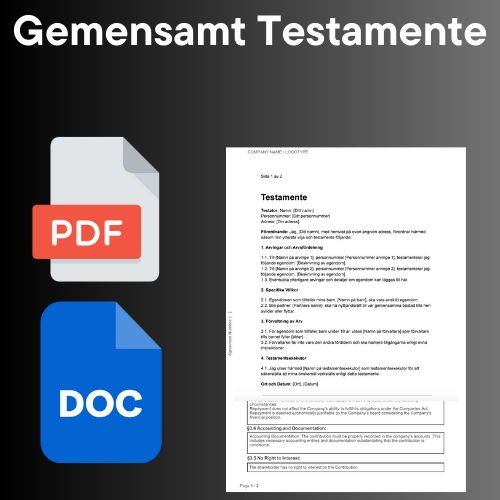When does a will become valid?
Share
Making a will is one of the most important steps you can take to ensure that your wishes are respected after your death. But for a will to be legally binding and valid in Sweden, it must meet specific requirements. In this article, we will go through what is required for a will to be valid, which formal aspects are critical, and how to avoid common mistakes that can invalidate a will.
Table of contents
- What is a will?
- The formal requirements for a valid will
- Special situations and exceptions
- How a will is executed
- Practical tips for drawing up a will
- Summary
What is a will?
A will is a legal document in which a person, called the testator, expresses their final wishes about how their estate should be distributed after their death. It can include both tangible assets, such as real estate and money, as well as intangible rights, such as rights to works or patents.
The formal requirements for a valid will
For a will to be valid according to Swedish law, it must meet certain formal requirements. These requirements are established to protect both the testator and the heirs, and to ensure that the will reflects the true will of the testator.
Written will
The first and most basic requirement is that the will must be in writing. Oral wills are not accepted in Sweden, except in very specific and exceptional cases, such as when a person is in immediate danger of death and does not have the opportunity to draw up a written document. In such cases, oral instructions must be witnessed by two people.
Testator's signature
The will must be signed by the testator to be valid. The signature must be made in the presence of two witnesses who must also sign the document. The testator's signature is proof that he approved the contents of the will.
The role of witnesses
The two witnesses must be present at the same time when the testator signs the will, and they must also be aware that it is a will they are witnessing. However, they do not need to know the contents of the will. It is also important that the witnesses are independent; they must not be relatives of the testator or named as beneficiaries in the will.
Testament witnesses
By law, the witnesses must not be under 15 years of age, nor must they be mentally ill or otherwise be under guardianship. It is also recommended that the witnesses have no financial interest in the will, to avoid potential conflicts and challenges in the future.
Date and place
To avoid confusion or disputes, it is important to state the date and place of when the will was written. This can be decisive if there are several wills drawn up at different times.
Special situations and exceptions
There are certain exceptions and special situations that can affect the validity of a will.
Emergency will
An emergency will can be drawn up if the testator is in an acute emergency situation, for example in the event of a life-threatening situation, and does not have the opportunity to draw up a formal will. In these cases, an oral will in front of two witnesses or a written will without witnesses may suffice. However, an emergency will is only valid for a limited time and must be confirmed with a formal will as soon as possible.
International wills
If the testator is a citizen of another country, or has property in another country, there may be special rules that apply. In these cases, it may be necessary to draw up multiple wills or to comply with specific international rules to ensure that the will is valid in all relevant jurisdictions.
Annulment of will
A will can be declared invalid if it turns out that the testator made it under the influence of mental illness, threat or coercion. It is therefore important that the will is drawn up under calm and clear circumstances, and that the testator has full understanding of the content.
How a will is executed
When a person dies and the will becomes relevant, it must be executed according to the instructions recorded. This is usually done through a probate where all assets and liabilities are compiled. The inheritance is then distributed according to the will's instructions.
Blame of will
If an heir is dissatisfied with the content of the will, or suspects that it was drawn up under invalid circumstances, he has the right to challenge the will in court. However, it is important to note that such a process can be both time-consuming and costly.
Legal advice
As wills are complex legal documents, it is always recommended to seek legal advice when drawing up a will. An attorney or legal practitioner experienced in inheritance law can help ensure that the will meets all legal requirements and that there are no ambiguities that could lead to future disputes.
Practical tips for drawing up a will
Making a will is a personal and important act. Here are some practical tips to make the process easier:
Use document templates
By using a document template for wills, you can ensure that all the necessary points are covered. Document templates are specially designed to meet the legal form requirements and can be easily adapted to your specific wishes.
Keep the will safe
Once the will is drawn up, it is important to keep it in a safe place, where it can be easily found after your death. It may also be wise to inform a trusted person about where the will is kept.
Update the will if necessary
Life circumstances change, so it is important to regularly review and update the will so that it always reflects your current wishes.
Summary
A will is an important legal document that ensures that your wishes are respected after your death. For a will to be valid in Sweden, it must meet specific formal requirements, including being in writing, signed and witnessed by two independent people. There are also special rules for emergency wills and international wills. Drafting a Will using a legally correct template document can be a good way to ensure that all requirements are met, and it is always recommended to seek legal advice to avoid potential disputes.




